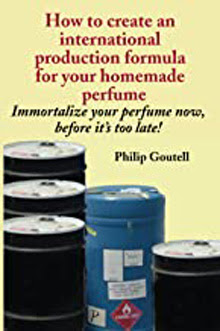The biggest error you can make in naming a perfume is to give it a name that is already in use by someone else. This puts you at a disadvantage in two ways. First, as your fragrance begins to become widely known and talked about, particularly online (something you greatly desire!), you risk getting a
cease and desist letter from lawyers who represent whoever was using the name before you. In other words, the more successful your fragrance becomes, the greater the risk you run of being banned from using the name.
The second disadvantage of using a name that is already is use is that since you cannot own the name,
it cannot add value to your business. As pointed out above, it can only add risk.
So why not give your new perfume a name the world has never seen before -- a coined name, a name invented
by you for the sole purpose of identifying your perfume. In the language of trademark lawyers, this is called a "fanciful" name -- a made up name -- a name that never existed until you created it for the sole purpose of naming your perfume.
A quick point here. What we are calling a
name, the legal world calls a
trademark. When you put a name on your fragrance and offer it for sale, that name becomes a trademark -- a trademark owned by you -- provided it is not already in use by someone else.
Do you see now why you might want an original name for your perfume?
Before you start thinking of a good original perfume name, take a look at these names and ask yourself what they mean:
VERIZON, STARBUCKS, KODAK, XEROX, EXXON, MICROSOFT, REEBOK.
Can you think of any meaning these words have other than the companies they name? These words -- names -- were all invented, for use as trademarks and they are strong trademarks.
Now look at these names:
GERANIDAR, FANATALITAS, AMAZINGREEN, BELLODGIA, TRUESTE.
These too are made up names, names of perfumes. Until these perfumes were launched these words did not exist. As trademarks they are strong and that is an added value for the companies that invented and used them (Syntomatic Corp., Parfums Fioret, Comme des Garcons, Caron, Tiffany).
Perhaps you would like a special name -- a name invented by you -- that exists exclusively to name (trademark!) your new perfume. Here are some suggestions.
Can you remember when girls were named Jane and Sally and Silvia? But now you might encounter Jayne, or Sahllie, or Cylvia. You can apply this renaming strategy to a perfume name.
But first look at a starting point.
A good starting point -- which will be the ending point for most who are naming perfumes -- is to develop a conventional name that ties together the scent and the marketing story, a name that romances the fragrance around the story/theme on which the fragrance was developed.
Then there are the checklists of other nitty-picky concerns to address but the big caution is to do your best to see if anyone else is already using the name you want. If this proves to be the case there are some strategies to work around the problem (but we won't go there today.)
Today I want to help you work with that that name you've just developed -- that name that ties together your scent and your story. I want to suggest to you that before you put this name on a bottle, you might look into the possibility that you can create a name that does all that your current name will do but will also give you stronger trademark protection, like the protection VERIZON gets from the "VERIZON" name and Tiffany gets from "TRUESTE." The strategy is to turn your normal name into a coined word that, if possible, captures the theme, the sound, the feel, and even the smell you want to represent.
Starting with your chosen normal name, start to play with the letters. Try rearranging them a bit. Try adding letters or subtracting letters. Try to create a new word that captures the feeling and even the sound of the word you started with but is new -- your invention.
Don't try to do it all in one sitting. Make a game of it. Sleep on it. Play with it again. You might come out with a great new -- totally original -- name for your perfume. But, if you don't, you haven't lost anything as you still have your normal name. And you might have better luck creating an original word to name your perfume next time. Give it a bit of practice.
(More of my thoughts on naming a perfume can be found in How To Create A More Valuable Name For Your Perfume.)



